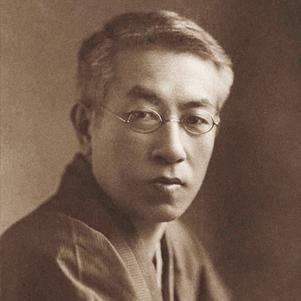Toson Shimazaki, a member of the first graduating class

Toson Shimazaki
1872-1943
Literary giant Toson Shimazaki entered Meiji Gakuin in 1887 at the age of 15 and was among its first graduating class four years later. When later asked by his alma mater to write the lyrics to the school song, Toson—despite experiencing severe economic and emotional hardships at the time—kindly agreed, saying, “It’s my duty.” The lyrics that he wrote are still used as the school song today. Toson continues to send us a message through this song, even now.
Born in 1872 in Magome, an old post town in the Kiso Mountains of Nagano Prefecture, Toson moved to Tokyo at the age of nine and enrolled in Taimei Elementary School, which still stands today in Sukiyabashi. Thereafter, he attended Mita English School and Kanda Kyoritsu School before enrolling in the Academic Department at the newly formed Meiji Gakuin in 1887. He was 15 years old. It was 1891 when he graduated as a member of the first graduating class. He was baptized during his time at the school.
His student years appear to have been most enjoyable. Toson touched upon his time at Meiji Gakuin in his novels, many of which were based on himself. For example, in When the Cherries Ripen, he reflects thus: “Those were the days when I used to go into the library and lose myself in biographies of Western poets and the like. . . Those were the days when I used to dash out of the dormitory with my friends in the hope of hearing some new theory concerning literature or religion or philosophy. How I enjoyed those days!”
After graduating, he wrote poetry and published an anthology of his poems while working as a teacher at a women’s school. He married in 1899 at the age of 27. However, his life certainly was not easy. With sales of his anthology falling far too short of the level needed to enrich his day-to-day life, he decided that it would be more appropriate to pursue a career as a novelist, rather than a poet. He eventually abandoned his profession after beginning to write his first novel, The Broken Commandment, the magnum opus that he was determined to publish. While he did self-publish the manuscript that he had completed thanks to a loan from relatives, he lived a very impoverished lifestyle during its writing and, partly because of his straitened financial circumstances, suffered the misfortune of losing his three young daughters to illness, one after another. It was just at this time that he received the request to write the lyrics to his alma mater’s school song.
Contents
A great debt of gratitude to his alma mater
“Meiji Gakuin still doesn’t have a school song. So I’d like to ask Toson Shimazaki to write the lyrics, since he’s an alumnus and active in literary circles as a writer of Shintaishi poetry . . .” In response to this request from then-president Kajinosuke Ibuka, Meiji Gakuin teacher and alumni association administrator Kenkichi Miyaji lost no time in visiting Toson at his small house in Nishi-Okubo. Toson was going through the most distressing time—he had just lost two of his daughters, his remaining eldest daughter was critically ill, and his wife was also unwell. Miyaji recollected that, seeing him in that situation, it was not easy to broach the subject that had brought him there. However, when he screwed up his courage and made the request, Toson accepted readily, saying, “It’s my alma mater, the institution that nurtured me, to which I owe a great debt of gratitude, so I’ll spare no effort. It’s my duty and an honor.” “I hope that the students will sing it often and that it will rouse their spirits,” he added.
Together with distant hopes
Toson soon wrote the lyrics that we have sung so often.
At the dawn of young lives in our earthly domain
When the school bell resounds, stirring our hearts
See the memorial tree standing firm on the hill of Shirokane
Its green leaves so fragrant, telling of the hopes of youth
Take heart, friends in learning, a new age awaits
Together with distant hopes, we each pave the way
With a spirit eternal as the heavens and earth
Live your life valiantly
Awaken, stand forth, and do not fear a thing
https://www.meijigakuin.ac.jp/en/about/history/guide/song.html
The words are skillfully chosen. While none are of a kind likely to be shouted at the top of one’s voice, they are beautiful and powerful, calling upon the students to stand together with distant hopes and pave the way to the future at this school where the ringing of the bell stirs people’s hearts and the fragrant leaves of the tree tell of the hopes of youth. As with The Broken Commandment, Toson consistently turned his gaze on himself in his subsequent literary endeavors. Society denounced some of his actions as disgraceful. However, honest to a fault, Toson remained rooted in reality and grappled with it with integrity. For Toson, the Meiji Restoration perhaps meant learning this kind of mental attitude from Western Europe. Just as the Meiji Restoration was showing signs of superficiality after Japan’s victories in its wars with China and Russia, Toson left a message for the young people following in his footsteps at his alma mater, exhorting them to reflect deeply within and improve themselves, as it is this that will open the way to a new age. This is a message that lives on in our hearts, transcending time itself.
